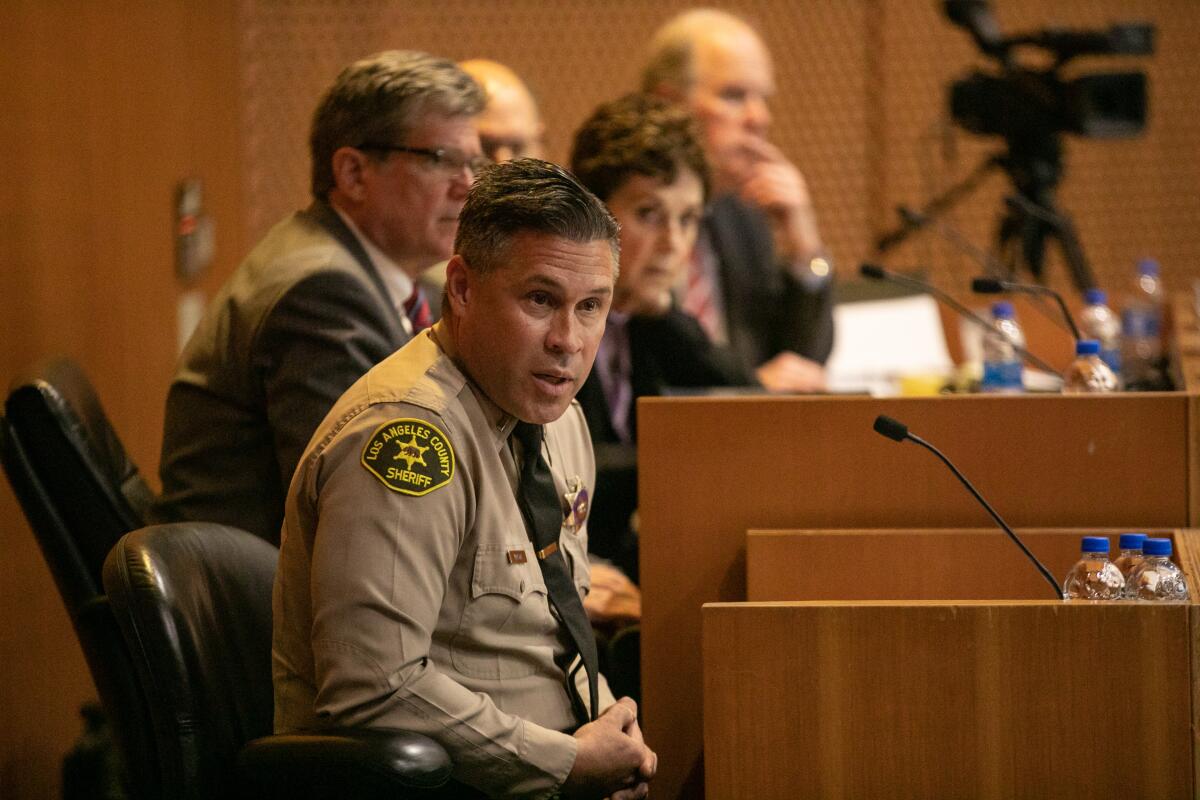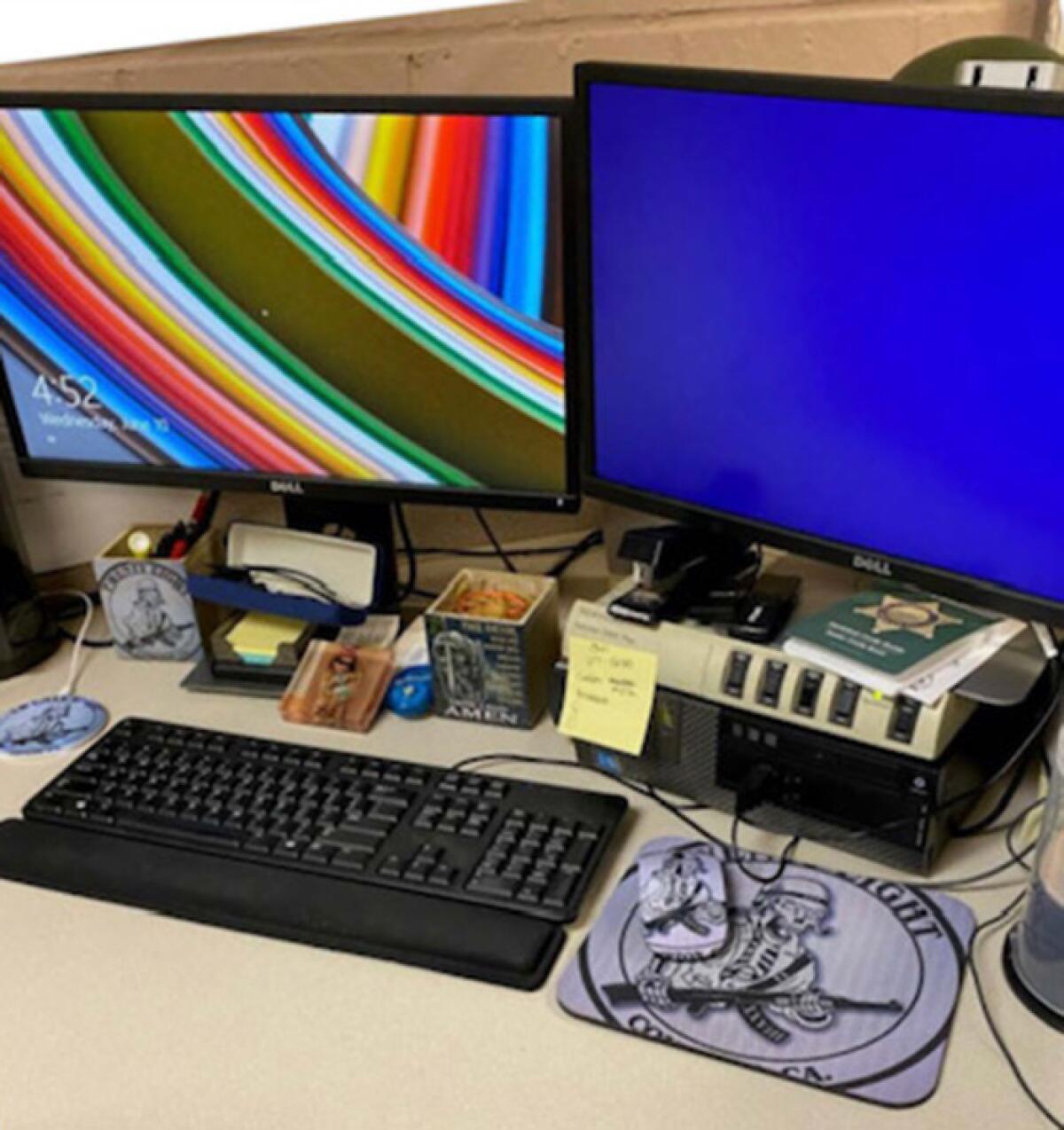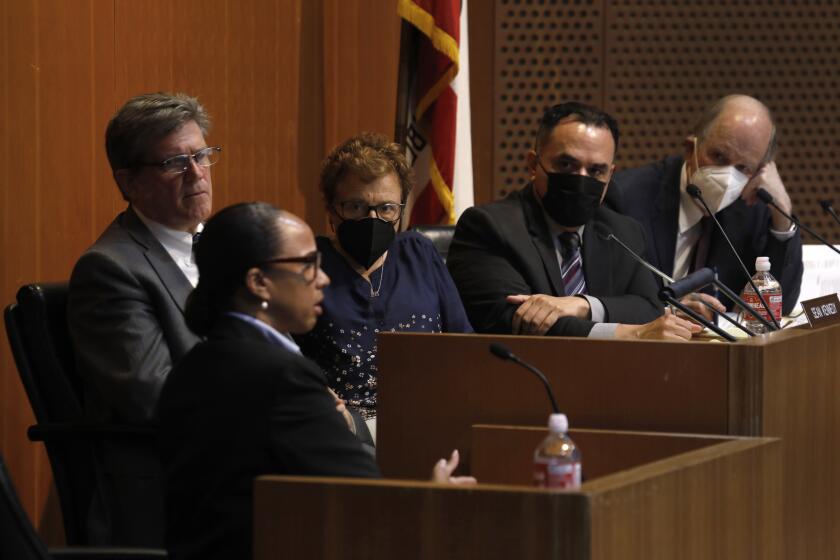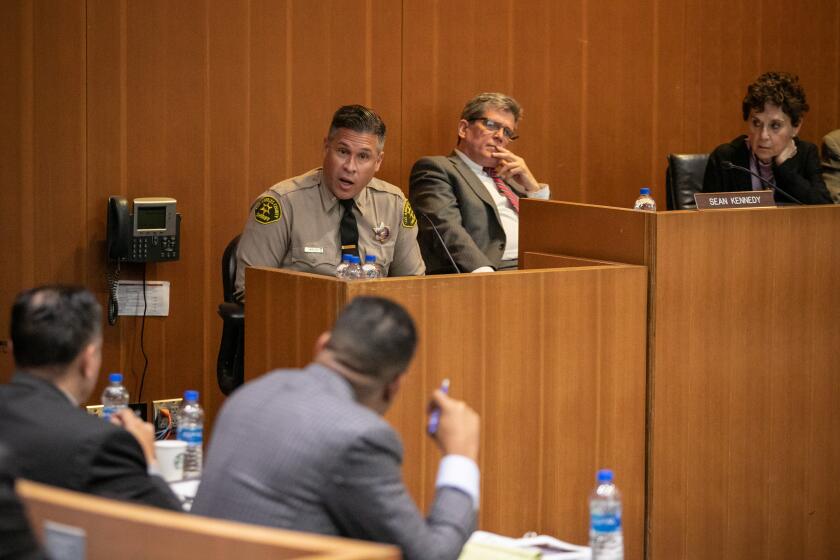Deputy accused of being in ‘Executioners’ gang reveals tattoo in court, names names

- Share via
When he stepped up to the witness stand last week, Los Angeles County Sheriff’s Deputy Jaime Juarez told the court about his first inking party — the day he got his Compton station tattoo. The intimate gathering was at a home somewhere in Pomona, and most of the people there were strangers.
But he knew the man who invited him, and knew that man sported the same ink Juarez was about to get — a design commonly linked to a suspected deputy gang known as the Executioners.
On Thursday afternoon, while testifying in a civil trial, Juarez pushed up a pant leg to reveal that tattoo: a helmet-wearing skeleton gripping a rifle. The rare and candid disclosure came in a case centered on the secretive world of deputy gangs, reports of which have plagued the Los Angeles County Sheriff’s Department for half a century and led to an array of investigations, studies and legal settlements.
The case that led to last week’s tattoo-bearing trial began in 2020, when Lt. Larry Waldie sued the county on claims of retaliation, alleging he was targeted and demoted after he “openly opposed” the Executioners’ control over the Compton station while he was acting captain there.
That trial continues, and its first two weeks have featured testimony from an array of current and former Sheriff’s Department officials. Some witnesses offered the names of everyone they’d seen with the so-called Executioners tattoo. One provided pictures of a detective bureau desk decorated with the group’s symbol in several places. Another — Juarez — explained the voting process used to decide who could get a tattoo and said he’d helped make that decision several times.
A new report by the Civilian Oversight Commission condemned the “cancer” of violent deputy gangs in the Los Angeles County Sheriff’s Department and urged a ban on the secretive groups.
But as much as last week’s testimony revealed, it also underscored the difficulties inherent in investigating the secretive cliques. The sheriff has acknowledged that deputy gangs exist and has created an office in his department to “eradicate” them.
Some witnesses — including former Sheriff Alex Villanueva — maintained otherwise. In the past, Villanueva took issue with the use of the term “deputy gangs,” sending the county Board of Supervisors a cease-and-desist letter last year to demand it stop using it.
During opening statements in the first week of trial, lawyers for the county argued that the issue of deputy gangs was not the source of Waldie’s problems in Compton.
“It has nothing to do with this case,” Sherry Gregorio told the court. “Lt. Waldie was not promoted to captain because there were just more people qualified for the position.”
Waldie — whose father was once an undersheriff in the same department — had been working as the operations lieutenant at Compton station for several months when he took over as the acting captain in January 2019.
At the time, Juarez was the Compton scheduling deputy, which gave him power in choosing the training and vacation schedules for others at the station. In early 2019, he approached Waldie with a list of other possible deputies he wanted to take over the scheduling position.
But Waldie said he believed Juarez was a tattooed member of the Executioners, and he wanted a new scheduling deputy who was not.
So he refused the request. In response, Waldie alleged, Juarez orchestrated a “work slowdown” at the Compton station. After Waldie complained to higher-ups, he said, Juarez was transferred to another station for a few months.
Former and current Los Angeles sheriff’s officials testified Tuesday about so-called “deputy gangs” allegedly operating within the department.
But that August, when Waldie applied to be the permanent captain at Compton, he was eliminated so quickly he wasn’t even considered in the top 10 candidates. Waldie’s lawyer argued that was an act of retaliation for complaining about gang activity — as was the department’s later refusal to let him transfer to another division.
Lawyers for the county told a different story, arguing that Waldie was not the most qualified candidate, that he himself was part of another tattooed group known as the Gladiators and that he’d promoted or given special assignments to people who were fellow Gladiators.
Much of the testimony Juarez gave last week echoed what he said previously when he gave a deposition in the case. Then, as now, he named names, spoke about inking parties and talked about the process for deciding who could get a tattoo.

Previously — on the advice of county counsel — Juarez hadn’t answered questions about his own tattoo. But this time, in addition to showing his ink, he explained some of the details. Specifically, he said that the tattoo was a “positive thing” and that its design includes the number 18 because he was the 18th person to get that tattoo. In total, roughly 40 deputies have the same tattoo, he said, adding that no one has a full list of them.
He also said “there’s no name” for the tattooed group, but those who bear the tattoo are sometimes referred to as “new ink,” while those who bear the same tattoo as Waldie are referred to as “old ink.”
He also disputed several aspects of Waldie’s claims and denied starting a work slowdown. Juarez said Waldie was lying if he alleged otherwise.
Another key witness last week was the former sheriff, who took the stand over two days. Villanueva alleged that Waldie’s “remarkable ascension” through the department was due to nepotism, which ultimately could have left him less qualified as a candidate for captain.
He also denied there were ever gangs inside the Sheriff’s Department and said he enacted an anti-gang policy only to address the “negative campaign” by the Board of Supervisors. He went on to tell the court that he’d never seen the skeleton tattoo until a photograph of it was published with a news article, and that he’d never conducted a study to determine which tattoos existed within the department.
“What concerns me is conduct, not tattoos,” Villanueva said, emphasizing that he’d directed others in the department to investigate the allegations of misconduct at Compton.
Los Angeles County has paid out roughly $55 million in settlements since 1990 in civil cases involving allegations that sheriff’s deputies belonged to a secret society, records show.
The tense testimony comes amid broader debates about when deputies can or cannot be forced to show their tattoos, or reveal the names of others who sport the same ink.
Earlier this month, Inspector General Max Huntsman, the county watchdog overseeing the Sheriff’s Department, ordered 35 deputies to come in for questioning and show their tattoos. Afterward, Sheriff Robert Luna sent out a departmentwide email directing deputies to cooperate with Huntsman’s investigation or risk discipline.
Days later, deputy unions filed a labor complaint and a lawsuit, arguing that the sheriff’s order circumvented the collective bargaining process and violated deputies’ constitutional rights.
Testimony in the trial continues Tuesday.
More to Read
Sign up for Essential California
The most important California stories and recommendations in your inbox every morning.
You may occasionally receive promotional content from the Los Angeles Times.

















